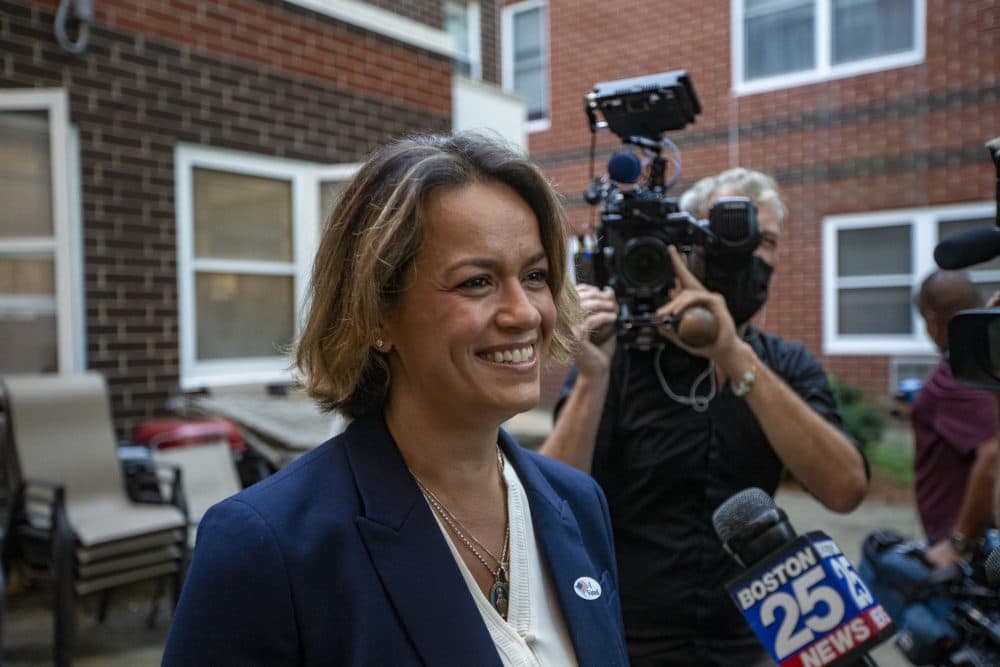Advertisement
2021 Boston Mayoral Race
Essaibi George Talks About Mayoral Preliminary Just Before Being Declared A Winner
Resume
City Councilor Annissa Essaibi George will face off against fellow City Councilor Michelle Wu in Boston's November election.
Essaibi George joined WBUR's Morning Edition host Bob Oakes to discuss her vision for Boston.
This interview was taped before The Associated Press had officially called the race. AP officially called the race at 10 a.m. on Wednesday with 100% of precincts reporting.
Interview Highlights
With the preliminary election over, the race to November is on. Tell us about the differences between you and Wu, who received the most votes on Tuesday. She's a progressive, a supporter of free public transit, rent-control, universal pre-K and child care. Can the city do all that?
"The city can't do all of that. ... I'm a supporter and proponent of universal pre-K and supporting our families with their childcare and early ed needs — we have to focus on that work. Child care and early ed, especially for our babies, it's so expensive for so many of our families. We need to find an answer and find solutions to that real challenge for our families here, across the city of Boston. We, as a city, cannot free the T. We certainly can work in partnership with our colleagues at the state level and the Legislature and at the MBTA to find ways to improve the T service. That is something that we need to do. When we think about the T as a public good, we need to make sure that it is good and that it is accessible and efficient and works for the people, especially here in the city of Boston. We've also got a lot of work to do around creating greater affordability in a housing market and to create very direct pathways to ownership for our city's families, for our city's residents in every neighborhood and every part of our city. I'm excited to engage in these conversations very directly with Councilor Wu and look forward to the work that we need to do as a city to make sure that we are representing and supporting our city's residents."
Boston is, of course, considered a pretty liberal or a very liberal city. You've been described as the most conservative candidate in the field during the preliminary election. Do you accept that label?
"I don't accept that label. ... I think that the work of leading the city is much more important and much more complex than labels allow for. I actually think it's a little lazy when people just sort of quickly go to these labels. I am proud of my work as an at-large city councilor representing some of our most vulnerable communities, especially when we think about the impacts of COVID on our communities of color over this last year and a half. When we think about the impacts of the opioid crisis and substance use disorders and homelessness and mental illness on many of our communities and the impact it has had on so many of our families across the city of Boston. I am very much focused on the work of providing high quality education for all of our students across our Boston public schools, in particular, and supporting our families to make sure that their kids have access to that high quality education. The label that I'm most interested in earning is that of mayor, and, at this point in time, throughout the course of the campaign, continue to do the work that I am committed to as an at-large city council councilor. We've got a lot of work to do to help our city's residents access economic opportunity, be a part of the workforce, to have access to high quality education, to make sure that we are working in partnership with our colleagues at the state level around public transit. We've got a lot of work to do. And I think that labels, you know, sort of take away from the importance of the work of leading the city."
Given all the issues facing Boston that we've both ticked off in just the last couple of minutes, let me ask you one more question: What is your vision of Boston under a Mayor Essaibi George?
"When I think about the work of my administration, it is about fulfilling the promise to the people of Boston that, you know, you have access to a high quality education at every school, every seat, every child is having that experience, that we can drive down the cost of housing in the city, that we can create greater affordability across the spectrum, including in the rental market, as well as ownership for our city's residents, that we are working every day to make sure that we have a safe city and a just city and that we are responding very directly to the needs of our city's residents. And that is on the big issues, whether it's education, whether it's climate action, whether it's public safety, whether it's transit, but also on the issues around basic city services that we are filling potholes, making sure that the streetlights turn on, that we are building playgrounds and picking up the trash. It is all very important when I think about my work that lies ahead and the legacy of an Essaibi George administration. It is about all of those things. And I think most important is that as mayor, and this has been my reputation as an at-large city councilor, that I am engaged with the people of Boston, that I am present in their communities, and that they have both access to me and that I am responsive and responsible to their needs as residents in the city."
This article was originally published on September 15, 2021.
This segment aired on September 15, 2021.
